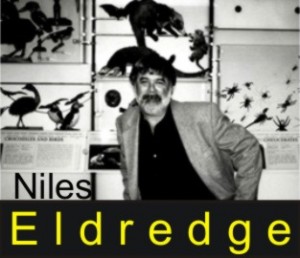 Natural selection is a simple scientific theory, according to the American Museum of Natural History, New York. For the museum’s Darwin Exhibit, the museum curator, Niles Eldredge, explains: “A century and a half ago, Charles Darwin offered the world a single, simple scientific explanation for the diversity of life on Earth: evolution by natural selection.”
Natural selection is a simple scientific theory, according to the American Museum of Natural History, New York. For the museum’s Darwin Exhibit, the museum curator, Niles Eldredge, explains: “A century and a half ago, Charles Darwin offered the world a single, simple scientific explanation for the diversity of life on Earth: evolution by natural selection.”
“Natural selection.” Eldredge explains, “is a simple mechanism that causes populations of living things to change over time.”
However, “simple,” according to Answers.com means 1) having or composed of only one thing, element, or part, and 2) not involved or complicated, easy, a simple task. Natural selection, though, is not a simple scientific theory.
Charles Darwin
For Darwin, however, natural selection was far from a “simple scientific” theory. In the First Edition of The Origin of Species: the term “simple” occurs 40 times, while “difficult” occurs 202 times. While “scientific” occurs four times, Darwin never used the phrase “simple scientific” in The Origin of Species.
In the Second Edition, Darwin added Chapter VI, entitled the “Difficulties of the Theory,” to address his critics. Contrary to the contention that natural selection is a simple and scientific theory, not only is it not simple, it is not scientific.
Contrary to Eldredge’s contention that Darwin’s natural selection theory is a “simple scientific explanation,” not only is it not simple but it is also conflicted and even contradictory.
Even Darwin acknowledged the problem. In a letter to Alfred Wallace in 1868, Darwin said –
“Nevertheless, I myself, to a certain extent, contradict my own remarks.”
Not only is natural selection not a simple scientific theory, Darwin, knowingly or unknowingly, crafted contradictions – playing two sides of the fence. On one side of the fence, Darwin argues that his theory is compatible with evidence from paleontology and the fossil record.
‘”Passing from these difficulties, the other great leading facts in paleontology agree admirably with the theory of descent with modification through variation and natural selection.”
On the other side of the fence, Darwin argues that the “required” fossil record fails to support his theory of natural selection –
“Existence of many links … does not yield the infinitely many fine gradations between past and present species required on the theory.”
Niles Eldredge
In the book Darwin, Discovering the Tree of Life, Eldredge follows this faux pas pattern –
“It [The Origin of Species] is a mature work in the best, and worst, senses of the term… allowing Darwin to hone his logic as he mustered his arguments.”
Darwin’s theory of natural selection, clearly, is not “a simple scientific theory.” Eldredge acknowledges natural selection as only an argument (not a theory based on scientific evidence), noting that his arguments are “the best and the worst” – conflicted, even contradictory.
Natural Selection Status
Darwin recognized that his theory was not, what Eldredge would eventually call, a “simple scientific theory.” In a letter to Hugh Falconer in October 1862, at least Darwin was honest enough to write –
“I look at it as absolutely certain that very much in the Origin will be proved to be rubbish.”
Evolution continues as a theory in crisis. Since the publication of The Origin of Species, with more than 150 years of scientific advances and a massive number of scientific investigations, David Conway of Cambridge University concedes –
“[The scientific evidence] provides us with reasons for doubting that it is possible to account for existent life-forms in purely materialistic terms and without recourse to design.”
Not surprisingly, the Darwin exhibit failed to attract any major corporate sponsorship. Nicholas Wapshott, a prominent British journalist for the Telegraph, said –
“The outbreak of corporate cold feet has shocked New York’s intellectuals…. They tried to find corporate sponsors, but everyone backed off.”
Eugene V. Koonin, senior investigator at the National Center for Biotechnology Information (NCBI), in his book The Logic of Chance, the Nature and Origin of Biological Evolution (2011), concluded –
“We think this argument [natural selection], although ubiquitous in the literature, is fallacious.”
Darwin’s Dilemma continues. Evolution is not a simple theory; natural selection is neither simple nor scientific.
Genesis
Max Planck, a German theoretical physicist, proposed the theory of quantum mechanics during the Scientific Revolution. In recognition of the significance of this theory, Planck had a worldview compatible with the Genesis account written by Moses –
“It is the steady, ongoing, never-slackening fight against skepticism and dogmatism, against unbelief and superstition, which religion and science wage together. The directing watchword in this struggle runs from the remotest past to the distant future: ‘On to God!’”
Refer to the Glossary for the definition of terms and to Understanding Evolution to gain insights into understanding evolution.

